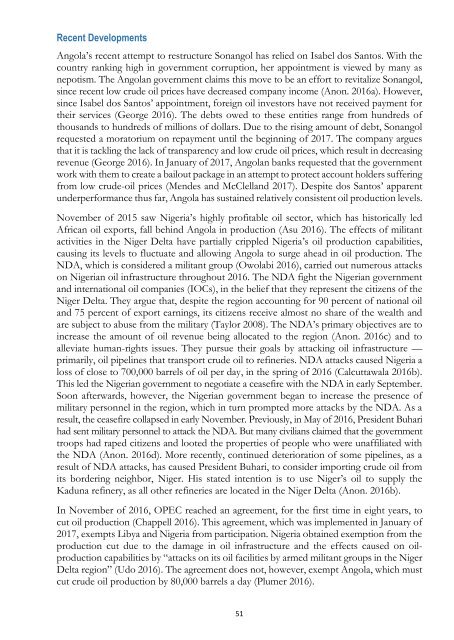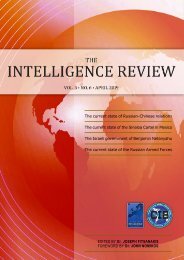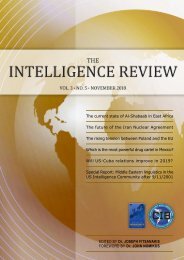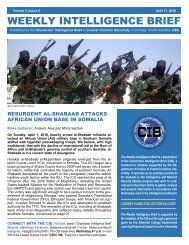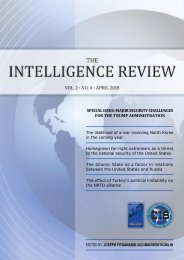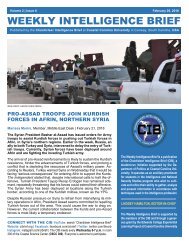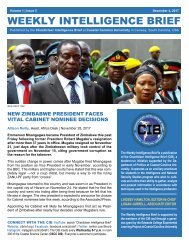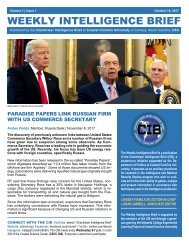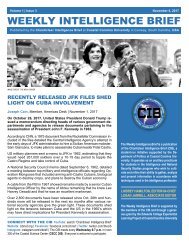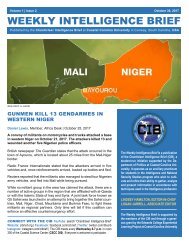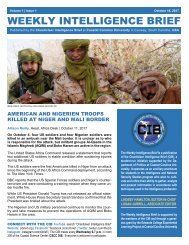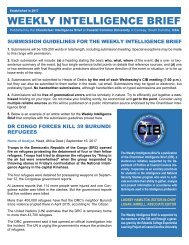The Intelligence Review | volume 1 | issue 2 |
This volume is the product of a collaboration between the European Intelligence Academy (EIA) and the Chanticleer Intelligence Brief (CIB), a student-run initiative supported by the Department of Politics at Coastal Carolina University in Conway, South Carolina, United States. Eleven CIB analysts tackle some of the most pressing and timely questions confronting intelligence observers today. Topics include the gun control debate in the United States, Russia’s involvement in the Syrian Civil War, the future of Kurdish nationalism, and the internal Palestinian dispute between Hamas and Fatah. Papers in this volume also examine the current state of Islamist extremism, and extrapolate on its future prospects in the Middle East, West Africa, the Lake Chad region, as well as in Southeast and Central Asia. CIB analysts propose carefully crafted and informed forecasts that outline future developments in some of the world's most unpredictable hot spots.
This volume is the product of a collaboration between the European Intelligence Academy (EIA) and the Chanticleer Intelligence Brief (CIB), a student-run initiative supported by the Department of Politics at Coastal Carolina University in Conway, South Carolina, United States. Eleven CIB analysts tackle some of the most pressing and timely questions confronting intelligence observers today. Topics include the gun control debate in the United States, Russia’s involvement in the Syrian Civil War, the future of Kurdish nationalism, and the internal Palestinian dispute between Hamas and Fatah. Papers in this volume also examine the current state of Islamist extremism, and extrapolate on its future prospects in the Middle East, West Africa, the Lake Chad region, as well as in Southeast and Central Asia. CIB analysts propose carefully crafted and informed forecasts that outline future developments in some of the world's most unpredictable hot spots.
- No tags were found...
You also want an ePaper? Increase the reach of your titles
YUMPU automatically turns print PDFs into web optimized ePapers that Google loves.
Recent Developments<br />
Angola’s recent attempt to restructure Sonangol has relied on Isabel dos Santos. With the<br />
country ranking high in government corruption, her appointment is viewed by many as<br />
nepotism. <strong>The</strong> Angolan government claims this move to be an effort to revitalize Sonangol,<br />
since recent low crude oil prices have decreased company income (Anon. 2016a). However,<br />
since Isabel dos Santos’ appointment, foreign oil investors have not received payment for<br />
their services (George 2016). <strong>The</strong> debts owed to these entities range from hundreds of<br />
thousands to hundreds of millions of dollars. Due to the rising amount of debt, Sonangol<br />
requested a moratorium on repayment until the beginning of 2017. <strong>The</strong> company argues<br />
that it is tackling the lack of transparency and low crude oil prices, which result in decreasing<br />
revenue (George 2016). In January of 2017, Angolan banks requested that the government<br />
work with them to create a bailout package in an attempt to protect account holders suffering<br />
from low crude-oil prices (Mendes and McClelland 2017). Despite dos Santos’ apparent<br />
underperformance thus far, Angola has sustained relatively consistent oil production levels.<br />
November of 2015 saw Nigeria’s highly profitable oil sector, which has historically led<br />
African oil exports, fall behind Angola in production (Asu 2016). <strong>The</strong> effects of militant<br />
activities in the Niger Delta have partially crippled Nigeria’s oil production capabilities,<br />
causing its levels to fluctuate and allowing Angola to surge ahead in oil production. <strong>The</strong><br />
NDA, which is considered a militant group (Owolabi 2016), carried out numerous attacks<br />
on Nigerian oil infrastructure throughout 2016. <strong>The</strong> NDA fight the Nigerian government<br />
and international oil companies (IOCs), in the belief that they represent the citizens of the<br />
Niger Delta. <strong>The</strong>y argue that, despite the region accounting for 90 percent of national oil<br />
and 75 percent of export earnings, its citizens receive almost no share of the wealth and<br />
are subject to abuse from the military (Taylor 2008). <strong>The</strong> NDA’s primary objectives are to<br />
increase the amount of oil revenue being allocated to the region (Anon. 2016c) and to<br />
alleviate human-rights <strong>issue</strong>s. <strong>The</strong>y pursue their goals by attacking oil infrastructure —<br />
primarily, oil pipelines that transport crude oil to refineries. NDA attacks caused Nigeria a<br />
loss of close to 700,000 barrels of oil per day, in the spring of 2016 (Calcuttawala 2016b).<br />
This led the Nigerian government to negotiate a ceasefire with the NDA in early September.<br />
Soon afterwards, however, the Nigerian government began to increase the presence of<br />
military personnel in the region, which in turn prompted more attacks by the NDA. As a<br />
result, the ceasefire collapsed in early November. Previously, in May of 2016, President Buhari<br />
had sent military personnel to attack the NDA. But many civilians claimed that the government<br />
troops had raped citizens and looted the properties of people who were unaffiliated with<br />
the NDA (Anon. 2016d). More recently, continued deterioration of some pipelines, as a<br />
result of NDA attacks, has caused President Buhari, to consider importing crude oil from<br />
its bordering neighbor, Niger. His stated intention is to use Niger’s oil to supply the<br />
Kaduna refinery, as all other refineries are located in the Niger Delta (Anon. 2016b).<br />
In November of 2016, OPEC reached an agreement, for the first time in eight years, to<br />
cut oil production (Chappell 2016). This agreement, which was implemented in January of<br />
2017, exempts Libya and Nigeria from participation. Nigeria obtained exemption from the<br />
production cut due to the damage in oil infrastructure and the effects caused on oilproduction<br />
capabilities by “attacks on its oil facilities by armed militant groups in the Niger<br />
Delta region” (Udo 2016). <strong>The</strong> agreement does not, however, exempt Angola, which must<br />
cut crude oil production by 80,000 barrels a day (Plumer 2016).<br />
51


